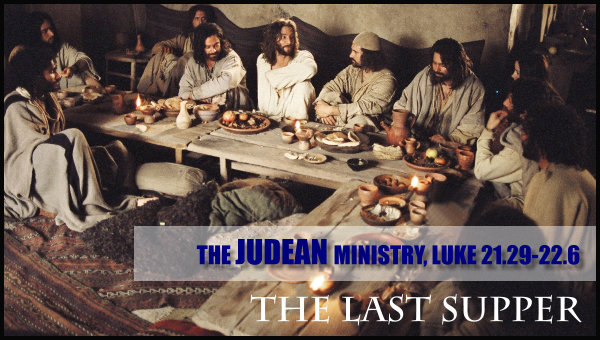By Tyson Thorne

The Judean Ministry at Various Cities (18.1-24.53), 22.7-35
The day of the Feast of Unleavened Bread (Passover) had come, and American readers may have difficulty understanding the timeline of events. Jewish holidays start at sunset on one day and end at sunset the next. This explains how Jesus and the disciples can have the Passover meal before the Passover sacrifice is made the following day. As the passage opens, Jesus instructs the disciples to follow a man carrying water to a house, and to rent a room from the owner of the home for their celebration. This reveals Jesus’ omniscience and surprising care for the smallest parts of our lives.
The disciples found the water carrier, the house, the owner and rented a room just as instructed. This is the same room the disciples will await the coming of the Holy Spirit in Acts 2. Here in Luke, however, there are other miracles and lessons to discover in this room at the Lord’s supper. You may have heard it said that Christianity is about a relationship, not a religion. I believe this to be true, regardless of those denominations that revel in religious artifacts and creeds. Even so, there are two regular practices in Christianity that could be called “religious”, and the Lord’s supper is one of them (baptism is the other).
The room had a large table at which Jesus and the disciples reclined to eat the traditional feast. In our church services today we’ve understated the occasion drastically. Tiny communion wafers and a sip of wine or grape juice doesn’t do justice to the meal that awaits us when Jesus again joins us (verse 16). Jesus mentions this feast will be celebrated in the Kingdom, and I have to wonder if the other feasts will be as well. There are seven feasts God instituted in the Old Testament, and they are celebrations not law. As such, I’ve often thought that the church should also be celebrating them.
At dinner, Jesus discussed the New Covenant; after Jesus took the unleavened bread and wine and used it to symbolize how the New Covenant would be made. The Old Covenant was made between Abraham and God, whereby a sacrifice was made, the cut in two. Normally, the two making the agreement would pass between the halves together showing the covenant must be kept by both parties. On this occasion, the Lord alone passed between the two pieces symbolizing that God was responsible for the agreement, that it did not depend upon man at all. The New Covenant would also be based upon a sacrifice, but this time rather than a bull it would be Jesus’ body.
Jesus then revealed that he would be betrayed by one at the table, and the disciples looked around to see who it could be. Remember, Judas is indwelt by Satan and would have been adept at blinding the others from the truth. The conversation drifted from trying to find the guilty party to which of them would be greatest in the kingdom, the very thing Satan wanted to be before the fall. Jesus ended the discussion with an important lesson, that the one who wants to be the greatest leader ought to humble himself to become the best servant, just as Jesus had.
During these last few days Jesus has been loose with his revelation of future events, and this evening is no different. The disciples will indeed be great in the new kingdom. They will each have their own throne and judge the twelve tribes of Israel. 12 disciples, 12 tribes, sounds like a good match until you factor Judas in. He of course will not be one of the judges, which is why the disciples had to replace him in Acts 1. But leadership comes with a price. Jesus tells Simon to pay attention, but it is something every ministry leader should read closely.
Just as we learned yesterday that Judas had to give Satan authority over him, here we learn that Satan has asked God for permission to rage against the disciples, and Simon in particular. Anyone who is doing a good work for the Kingdom of God is prone to such attacks. It may come in the form of fear, temptation or a pet sin that helps drive a wedge between you and the Lord. Also like Peter, we have God watching over, assuring that Satan cannot go too far. This is why it is written that no temptation will come to us that we cannot find a way to avoid or overcome (1 Corinthians 10.13). Keep in mind that there is no guarantee that we will not face demonic oppression, only that through Jesus we can overcome. We must stand firm in our faith. Should we fail we ought to follow Peter’s example, and in our grief and brokenness return to God and continue to strengthen others.
|
|
